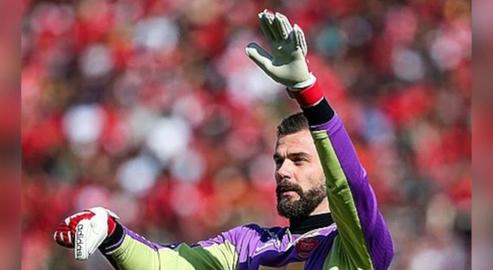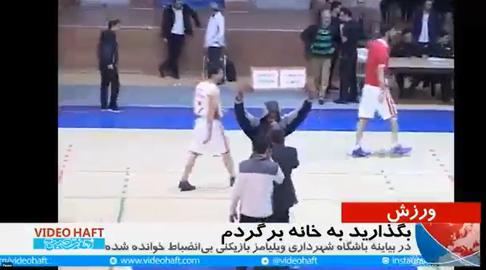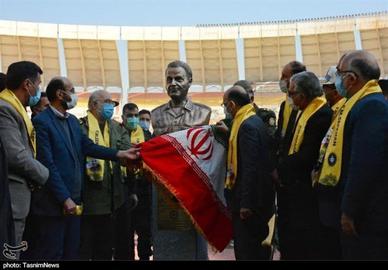This week Iranian media reported the abrupt departure of Bozidar Radosevic, the Croatian goalkeeper of Persepolis FC. After fruitless attempts to recoup money owed to him by the club, Radosevic, who first joined Persepolis in 2016, has reportedly left Tehran and is planning to sue his former managers.
The IRGC-affiliated Fars News Agency and others report that one day before Radosevic left, managers at Persepolis had asked him to hand over his passport in exchange for 15 percent of the money. This indicates they feared he would walk away for good: something he was legally entitled to do under FIFA rules.
It’s not the first time sporting officials in Iran have tried to take foreign players’ passports for use as collateral. After a bust-up with the Iranian Football Federation in early 2015, the national football team’s then-manager Carlos Queiroz left the country for a period, threatening to walk away. When he did come back to Iran, his passport was confiscated. “I am being held hostage in Iran by the country's football federation,” Queiroz said at a press conference that April, going on to say that what had happened had damaged his domestic and international reputation.
The official pretext given to Queiroz at the airport was “accumulated tax debts”: a line promoted by Fars News Agency. The security agencies’ media organ accused Queiroz of “engaging with all the elements of Iranian football during the last four years, and insulting each and every one of them”, emphasizing that paying taxes was his civic duty.
In fact, Queiroz’s contract explicitly stated the coach’s taxes should not be paid by him personally, but by the Football Federation: something that rarely if ever happens in European or Persian Gulf countries, but is commonplace for foreign players and coaches in Iran. Banking on this being little-known, sports managers have nevertheless used the tax excuse to bar several wayward sportspeople from leaving the country.
Afshin Ghotbi, an Iranian-American who had lived in the US from age 13, also had his passport withheld in Iran. He returned to Tehran to coach Persepolis in 2007, at a time when Habib Kashani was the club chairman. Kashani was one of Mahmoud Ahmadinejad’s closest aides, and in his memoirs, openly admitted to having kept Ghotbi’s American passport in the safe until the final day of his contract in 2008.
In 2011, the Argentine volleyball player Julio Velasco was signed as head coach of the Iranian national team. His passport was also held “for safe keeping” by Mohammad Reza Davarzani, a corrupt former IRGC commander and director of the Guards’ Physical Education Department, until his last contract came to an end in March 2014.
The case of Courtney Pigram, an American professional basketball player, beggared belief. Pigram joined the Gorgan Municipality basketball team in 2015 and his passport apparently suffered the same fate. In the middle of a game in 2017, he held up a sign that read in Persian and English: "I want to go home".
So too did the story of Winfried Schaefer, a German football manager and former player who became head coach of Esteghlal FC in October 2017. He brought the team to the AFC Champions League, but later described the following year as a “nightmare” with no support and indeed “sabotage” by the management.
On touching down at Tehran’s Imam Khomeini Airport in June 2018, both Schaefer and Czech then-coach Jiri Sanak had their passports confiscated. Iranian media reported again that this was due to unresolved tax issues. They received them back only after Schaefer warned: “It is Esteghlal’s duty to give back my passport, and if this does not happen within the next week, Esteghlal will have a big problem.”
In January 2021, Hrvoje Milic, a Croatian defender who had signed with Esteghlal in August 2019, left Iran suddenly and at night, stating that he was returning home with “a heart full of sorrow”. Fars News Agency reported that Milic had not been paid for two months and had only received his passport back from Esteghlal on the pretext that he needed to go to the Croatian embassy in Tehran. The report came with another disclosure: “Players' passports must be in the possession of the club's international deputy.”
If Iranian football’s most recent émigré, Bozidar Radosevic, complains to FIFA, bosses at Persepolis could be held liable for up to $600,000 dollars reportedly owed. No small wonder they tried to hold his passport while delaying on payments. An important part of Iranian football management is putting pressure on coaches to get them to compromise, and finding ways to hold onto them when the money invariably runs out. In fact, Fars reports, Persepolis managers even asked Radosevic if they could hold onto his passport for another week, so as to get him a work visa. He left that night.
Related coverage:
Foreign Sports Coaches Are Fleeing Iran
Persepolis Debt to Coach Gabriel Calderón Being Paid From Shia Cash Offerings
Iran's Football Manager May Quit After Six Months – Without Pay
Did Team Melli Just Arrive in Beirut With Suitcases Full of Cash?
The Man Behind Corruption and Embezzlement in Iranian Sports
'No Plane' to Take Iran's National Football Team to Lebanon
Ex-Referee Blows the Whistle on Match-Fixing in Iran
The Return of the Ultimate (and Corrupt) Football Insider
Jobs for the Boys: Business Partner of Official's Sons Gets Top Football Role
visit the accountability section
In this section of Iran Wire, you can contact the officials and launch your campaign for various problems























comments